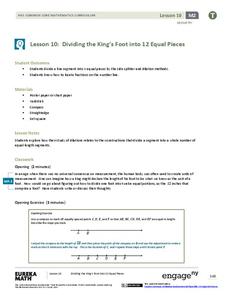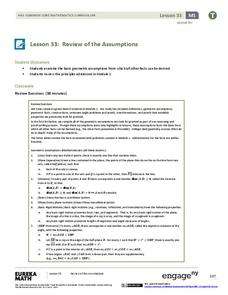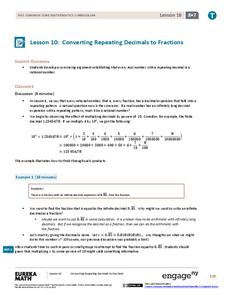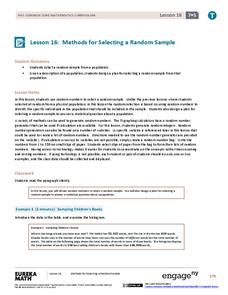Discovery Education
Clutter Cutter
Challenge young learners to cut the clutter with this fun engineering project. As employees of a home and office supply company, young engineers are asked to develop devices that organize everyday items. After participating in a...
EngageNY
Dividing the King’s Foot into 12 Equal Pieces
Apply, apply, apply! A measurement lesson applies a number of concepts to help learn a new construction. Scholars learn to divide a segment into n equal parts using a method that uses the Side Splitter Theorem and a method that...
EngageNY
Similarity
Learn similarity through a transformations lens! Individuals examine the effects of transformations and analyze the properties of similarity, and conclude that any image that can be created through transformations is similar. The...
Curated OER
Out of the Dust: Biopoem
As part of their study of Out of the Dust, readers create a biopoem for one of the characters in Karen Hesse's 1998 Newbery Medal winning verse novel.
EngageNY
Comparing Rational Expressions
Introduce a new type of function through discovery. Math learners build an understanding of rational expressions by creating tables and graphing the result.
EngageNY
Solve for Unknown Angles—Angles and Lines at a Point
How do you solve for an unknown angle? In this sixth installment of a 36-part series, young mathematicians use concepts learned in middle school geometry to set up and solve linear equations to find angle measures.
EngageNY
Euler’s Number, e
Scholars model the height of water in a container with an exponential function and apply average rates of change to this function. The main attraction of the lesson is the discovery of Euler's number.
EngageNY
Comparing Linear and Exponential Models Again
Making connections between a function, table, graph, and context is an essential skill in mathematics. Focused on comparing linear and exponential relationships in all these aspects, this resource equips pupils to recognize and interpret...
EngageNY
Review of the Assumptions (part 1)
What was the property again? Tired of hearing this from your pupils? Use this table to organize properties studied and as a reference tool for individuals. Learners apply each property in the third column of the table to ensure their...
EngageNY
The Long Division Algorithm
Two methods are always better than one! The eighth installment in this series asks pupils to convert decimals to fractions using two approaches. Individuals first use the more traditional approach of long division and then use reverse...
EngageNY
Cones and Spheres
Explore methods for finding the volume of different three-dimensional figures. The 20th lesson in the 25-part series asks learners to interpret diagrams of 3-D figures and use formulas to determine volume. Scholars must use the...
EngageNY
Converting Repeating Decimals to Fractions
Develop a process with your classes for converting repeating decimals to fractions. Through this process, pupils understand that any repeating decimal can be written as a fraction. The 10th lesson in this 25-part module helps...
EngageNY
Methods for Selecting a Random Sample
Random sampling is as easy as choosing numbers. Teams use random numbers to create a sample of book lengths from a population of 150 books. The groups continue by developing a technique to create samples to compare from two populations...
California Department of Education
Roadmap to Success
Life is a highway ... where will yours lead? Scholars pave the way toward success in the fourth of five college and career readiness lesson plans. Using the SMART system, individuals begin mapping out the steps they will follow to...
Illustrative Mathematics
How Many Buttons?
Bring the class into the probability by having everyone count buttons on their shirts. Organize the data into the chart provided and chose different possibilities such as "female with one button" or "all learners with more than four...
Curated OER
Finding Meaning in the Badge
Children who are three to five years old study two rank badges from the Qing dynasty to develop an understanding of social rank, language skills, and symbolism. The lesson is discussion-based and requires learners to compare and contrast...
Dick Blick Art Materials
Ball Point Engravings
Turn simple pencil sketches into colorful engravings. After first creating hand-drawn pictures, young artists then trace over them will ball point pens, etching the images into cold press illustration boards, before rubbing...
Kids Yoga Stories
Valentine's Day - LOVE
Open your heart with a refreshing yoga session designed for Valentine's Day. With visual cues of hearts and other festive decorations, participants begin a series of yoga poses designed to open their heart chakras and to reflect on...
Gobal Oneness Project
Building a Community of Trust
Barrio de Paz is the story of Nelsa Libertad Curbelo, a nun, who works with the gang youth of Guayaquil, Ecuador. The 17-minute documentary focuses on her explanations for the rise of gangs and for how gang culture reflects...
Curated OER
Charlie and the Chocolate Factory
Fourth graders research and write an author report on Roald Dahl, including books written by him, birthplace, family life, and other information on his writing. Students read aloud chapters in the book. Students create a newspaper...
Curated OER
Spain and Bullfighting
Middle schoolers research Spain and bullfighting. They use the Internet and other reference materials. Spain's bullfighting festivals and activities will be used as a springboard for inspiring students to write creatively.
Curated OER
Stem Cells and Cloning
Learners discuss an article on cloning and stem cells and complete an Internet cloning activity. In this genetic engineering lesson, students analyze stem cell issues by reading an article and participating in a class discussion. They...
Curated OER
Treasures of the Silk Roads
Students examine and discuss art objects from the Silk Roads. They analyze images of artifacts, create a word map, and develop and write a short story or poem based on the slides viewed.
Curated OER
All About Me
Students are introduced to the characteristics of an autobiography. After reading excerpts from "The Diary of Anne Frank", they discuss how two people can see the same event in different ways and write about the event in the journals...























